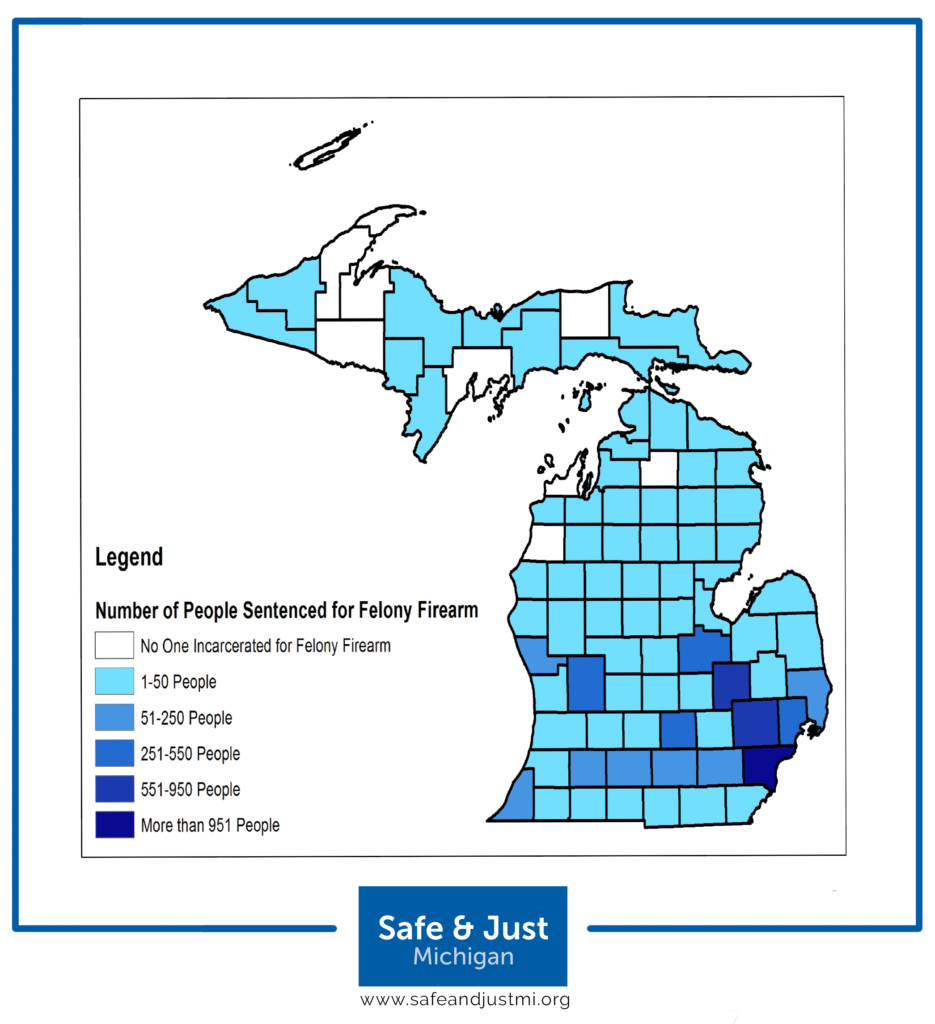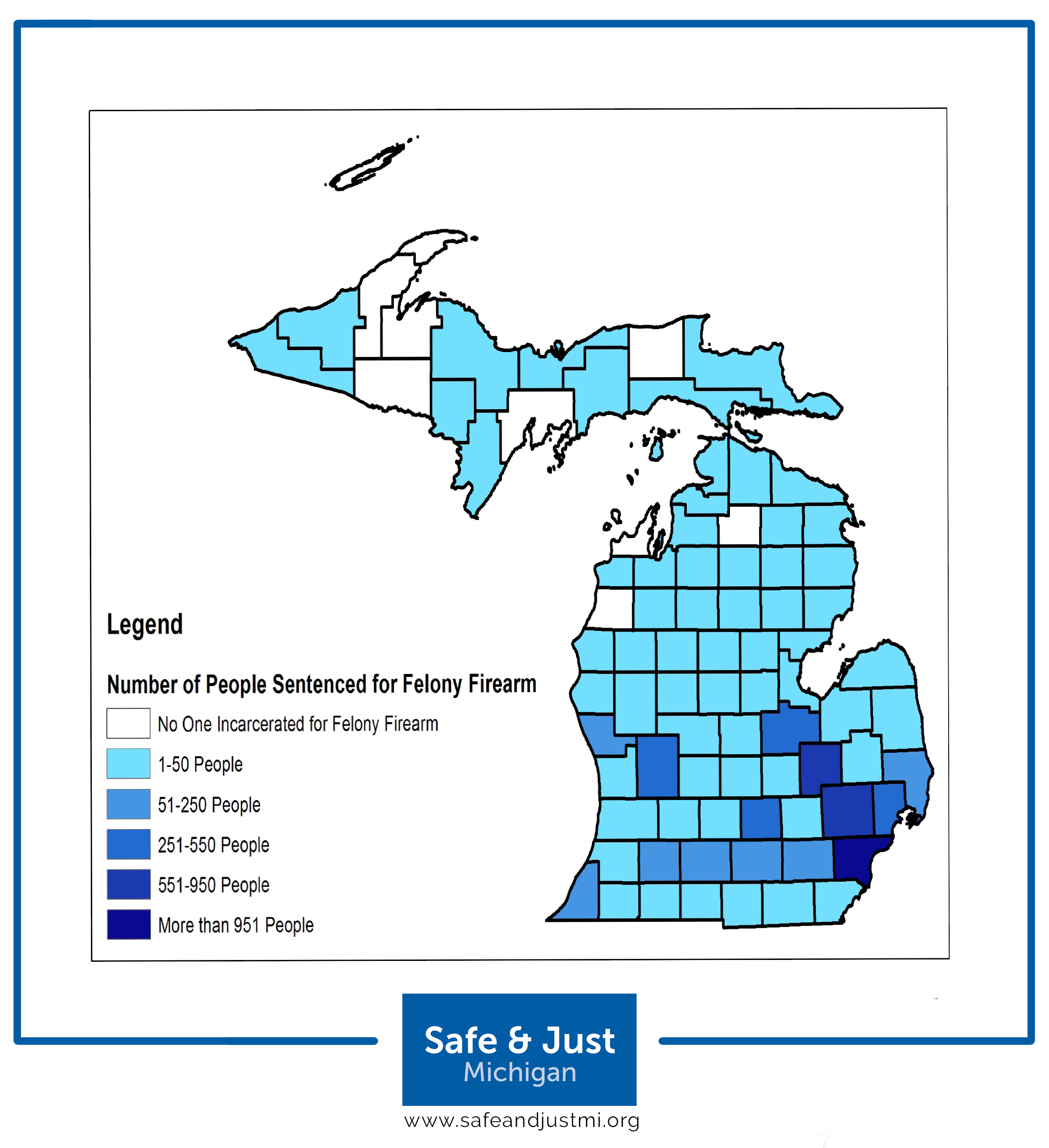Last week, Safe & Just Michigan released its first report in five years! Our new report examines the 40-year history of the felony firearm statute and the effect it has had on Michigan residents and prisons.
Michigan’s felony firearm statute makes it a crime for a person to be in possession of a firearm during the attempt or commission of a felony. The broad application of the law is problematic, as it applies to situations where the firearm is legally owned or even when the firearm is not used in the commission of the felony. The felony firearm law imposes a mandatory sentence of two years for a first offense, and five- or 10-years for subsequent offenses. The statute is one of the few mandatory sentences left in the state’s criminal code. Additionally, the decision to charge for a felony firearm is solely at the discretion of the county prosecutor. Due to the mandatory nature of the sentence, judges cannot consider any other ruling.
In recent years, issues related to the statute have been highlighted several times. In 2015, HBs 4419-20 were introduced to eliminate the mandatory nature of the sentence and give judges discretion in determining a punishment for the first offense. Those bills didn’t gather enough support to advance through the Legislature. Then, in 2017, the statute received significant media attention due to the publicity of the case of Siwatu-Salama Ra. This summer, legislation was once again introduced to address the problems with this state law.
The attention to this statute is valid. More than a quarter of the Michigan prison population in October 2018 had at least one sentence for a felony firearm offense.

Black people in Michigan comprise just 14 percent of the state’s population, but are heavily over-represented in prison, where they account for 53 percent of the incarcerated population. Among people incarcerated on felony firearm charges, the disparity is even worse, with Black people comprising 82 percent of those sentenced.
One of the most important findings of the report is the racial disparity prevalent among charging and sentencing for felony firearm offenses. Approximately 82 percent of those sentenced for a felony firearm sentence are identified as Black. Safe & Just Michigan is not the only group to point out the racial differences in the application of this law.
Take for example, the recently established citizen-led organization, Citizens for Racial Equity in Washtenaw (CREW), which released a report titled ‘Race to Justice.’ The report examined data between 2017 and 2019, finding that the data provides support to what many community members have been voicing for years: there are vast racial disparities in our criminal legal system. One of the offenses where disparities were most apparent was felony firearm. In the time under study, 25 people of color were charged with a felony firearm offense, compared to only 2 people who were identified as white. Further in the process, both charges against whites were dropped, while 64 percent of the people of color were convicted of a felony firearm offense.

Michigan’s county prosecutors don’t apply felony firearm charges evenly. Wayne County accounted for more than half of felony firearm convictions in 2018, though the county is home to just 17 percent of the state’s residents.
Related to the racial disparity of the implementation of this law, there are also geographic differences in the application of the felony firearm statute. Generally, we lack data about how felony firearm charges are used in plea bargaining. The CREW data is a unique peek into the black box of prosecutor discretion. Despite this, from looking at sentencing data, there are apparent differences in charging practices across the state. For example, there are a handful of counties that did not have anyone sentenced to incarceration for felony firearm in October 2018, while other counties, such as Wayne County, sent more than 5,000 people to prison with at least one felony firearm sentence.
Recently introduced House Bills 5993–94 are a step in the right direction to end the issues caused by the felony firearm statute. The proposed changes to the statute could save millions of dollars annually, according to estimates. However, these bills will not go far enough toward reversing the explosive growth Michigan has seen in prison growth and corrections spending. It is vital that the mandatory nature of the felony firearm sentence is eliminated at all levels.
We invite you to read our entire report, which includes detailed information about the racial and geographical disparities of felony firearm sentencing and the overwhelming amount Michigan taxpayers stand to save if we reform this problematic law. Please read the full report here.
~Anne Mahar
Research Specialist
~Sophie Ordway
Research Intern

